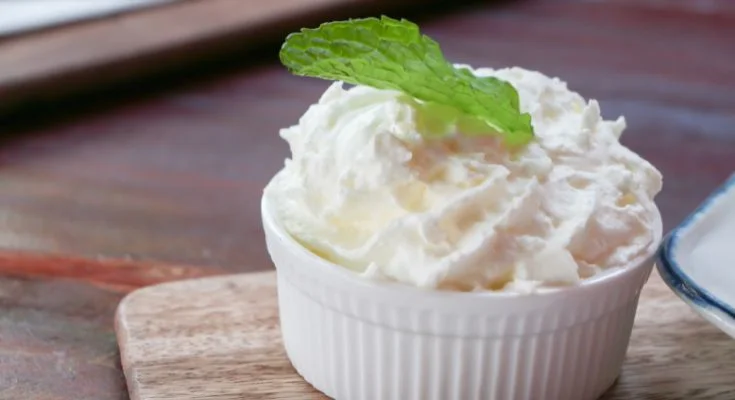Whipped cream is a delicious and versatile topping that adds a creamy and airy texture to desserts like cakes. It’s often used to enhance the taste and presentation of various sweet treats. However, you may find yourself with leftover whipped cream after decorating a cake or dessert.

Understanding Whipped Cream
Before we delve into the freezing aspect, let’s understand whipped cream. Whipped cream is made by whisking heavy cream until it thickens and forms soft peaks. It’s commonly sweetened with sugar and sometimes flavored with vanilla extract.
The air incorporated during the whipping process gives it a light and fluffy texture, making it an ideal accompaniment to cakes, pies, and hot beverages.
Can You Freeze Whipped Cream?
The answer is yes, you can freeze whipped cream, but it’s important to note that the texture may change after thawing.
Freezing alters the structure of the cream, leading to a denser consistency compared to its freshly whipped state. However, it can still be usable and enjoyable if certain precautions are taken.
The Freezing Process
When freezing whipped cream, it’s crucial to prepare it properly to maintain its quality. Follow these steps for the best results:
- Transfer the leftover whipped cream into an airtight container or freezer bag. Ensure that the container is clean and dry.
- Gently press down on the whipped cream to remove excess air and create a smooth surface.
- Seal the container tightly to prevent any air or moisture from entering.
Potential Issues
While freezing whipped cream is possible, there are a few considerations to keep in mind:
- Texture Changes: As mentioned earlier, freezing whipped cream alters its texture, resulting in a denser consistency. This may not be ideal for certain applications, such as piping delicate designs on a cake.
- Separation: There is a risk of the cream separating after thawing, which can lead to a grainy or watery texture. However, this can be mitigated by gently whisking the cream after it thaws.
- Limited Shelf Life: Frozen whipped cream should be consumed within a month for the best taste and quality. Over time, it may develop an off-flavor or lose its original texture.
Tips for Freezing Whipped Cream
To ensure the best possible outcome when freezing whipped cream, consider the following tips:
- Use Fresh Cream: Start with fresh and high-quality heavy cream to achieve better results.
- Avoid Over-Whipping: If you plan to freeze whipped cream, avoid over-whipping it initially. Over-whipped cream tends to be more prone to texture changes after freezing.
- Smaller Portions: Divide the whipped cream into smaller portions before freezing. This allows for easier thawing and minimizes waste.
- Label and Date: Remember to label the container with the date of freezing to keep track of its shelf life.
- Alternative Sweeteners: If you prefer to use alternative sweeteners, such as powdered sugar or honey, when whipping the cream,it’s important to note that they may affect the texture of the frozen whipped cream differently. Experimentation may be needed to find the sweetener that works best for your desired outcome.
Thawing Frozen Whipped Cream
When it’s time to use the frozen whipped cream, proper thawing is essential to achieve the best texture and taste. Follow these steps:
- Transfer the frozen whipped cream from the freezer to the refrigerator. Allow it to thaw slowly overnight or for several hours until it becomes soft.
- Once thawed, gently whisk the cream to restore its smoothness and incorporate any separated liquids.
- Avoid using heat or microwaving to speed up the thawing process, as this can further alter the texture and lead to an undesirable outcome.
Using Frozen Whipped Cream
While the texture of thawed whipped cream may not be as light and fluffy as freshly whipped cream, there are still several ways to use it effectively:
- Cake Decorations: If you plan to use the whipped cream for cake decorations, consider opting for simpler designs that don’t require intricate piping. The denser consistency of thawed whipped cream makes it better suited for spreading or dolloping onto cakes.
- Fillings and Toppings: Frozen whipped cream can be used as a filling or topping for pies, pastries, or other desserts. Its creamy texture adds a delightful element to various sweet treats.
- Hot Beverages: Add a dollop of thawed whipped cream to hot beverages like hot chocolate or coffee for a decadent touch. The cream will melt and create a creamy and flavorful experience.
FAQs
Yes, homemade whipped cream can be frozen. Just make sure to follow the proper freezing and thawing techniques mentioned in the article.
Whipped cream in a can is not suitable for freezing. The propellants and preservatives in canned whipped cream can cause the texture to become grainy or separated after thawing.
Yes, you can re-whip thawed whipped cream to restore its smoothness and incorporate any separated liquids. Use a whisk or electric mixer on low speed until the desired consistency is achieved.
Frozen whipped cream is best consumed within a month for optimal taste and texture. After that, it may start to develop off-flavors or lose its original quality.
While you can technically freeze whipped cream on a cake, it’s important to consider the potential texture changes. The whipped cream may become denser after thawing, which can affect its appearance and mouthfeel.
Conclusion
In conclusion, freezing whipped cream is possible, but it does come with some texture changes. While the thawed whipped cream may be denser than freshly whipped cream, it can still be used effectively in various applications. By following proper freezing and thawing techniques, you can preserve the whipped cream and enjoy its creamy goodness even after freezing.
